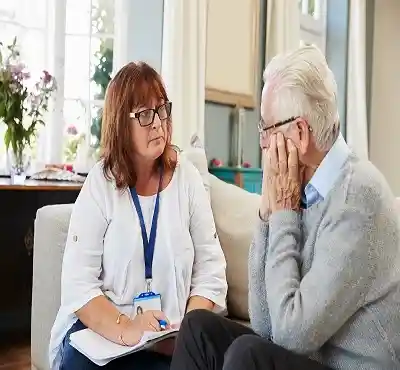In this decade, depression happens to be one of the most common disorders which are found across all age groups. The two most common forms of depression are Dysthymia (persistent or long-term depressive disorder) and acute depression. Other serious depressive disorders have also been measured and may vary based on level of severity, duration and persistence. The common symptoms of this disorder are feelings of hopelessness, despair, futility, fatigue, abnormal sleeping or eating
Based on these emotions, a person with depression may tire out sooner than the average person when engaging in daily activities. There are also increased levels of lethargy and a lack of interest or desire in doing anything.
In medical terms, the lack of interest or reduced desire to engage in activities that are normally enjoyable is known as Anhedonia. For example, you might have been an excellent presenter in the sales team. But all of a sudden, you have lost your zeal just because your motivation level has decreased. This can be a symptom of Anhedonia.
Is Depression a Disability?
Depression may constitute a disability depending on the degree of distress it causes to a person. The root cause of all depression-related disorders is generally an event that occurred which had much emotional importance to a person. Such events can include death, separation, or another traumatic event. A person can be sidelined from all forms of professional and personal work due to acute depression disorders. Hence, depression and disability can be connected.
In most cases, depression is short-lived and the feeling subsides within a week or so. There are other chronic cases, however, where it is difficult for an individual to overcome his or her depression. Such cases are referred to as clinical depression.
Clinical depression doesn’t allow an individual to cope with their day-to-day activities. It has a significant impact on a person’s motivation. The effects can be seen in both a person’s professional and personal life. The person may not work as he or she did earlier and there is a visible change in behavior. Multiple cases of clinical depression occur because of genetic, environmental or other biological factors.
Can You Get Disability for Depression?
 Yes and No. It is possible for you to get disability benefits if you are suffering from severe depression to the extent that it becomes a disability. There are strict medical guidelines that are reviewed, and afterward, the decision is made by a legal panel. It is always advisable to hire a Social Security Disability lawyer who specializes in relevant disability cases, such as the attorneys at Khattar Law, PC
Yes and No. It is possible for you to get disability benefits if you are suffering from severe depression to the extent that it becomes a disability. There are strict medical guidelines that are reviewed, and afterward, the decision is made by a legal panel. It is always advisable to hire a Social Security Disability lawyer who specializes in relevant disability cases, such as the attorneys at Khattar Law, PC
Once you hire our law firm to represent you, we will analyze your case in detail. We will follow the right legal approach to help you get your disability claims.
To answer the original question – Can some receive disability for depression? Well, the answer is yes.
There are certain types of depressive disorders that would qualify a person for disability benefits. If a person is found to have one of the listed types of impairments, this would make him or her eligible to claim disability benefits. To really understand the types of symptoms that would qualify you to be eligible to apply for disability benefits, see the brief description given below.
Social Security refers to a list which is provided by the American Psychiatric Association. It states that there are three major types of depression. , If a person has one of these major types of depression, then he or she may have a strong claim for SSD benefits.
- Major Depressive Disorder
A person with Major Depressive Disorder generally shows the major symptoms of clinical depression. These include feelings of hopelessness, persistent emotional emptiness, low self-esteem, fatigue, reduced sleep, a major change in appetite, suicidal tendencies and/or more. These symptoms are present in the individual for more than a couple of weeks.
- Dysthymia
This is a form of mood disorder. The symptoms are quite similar to what one would observe in major depressive disorder, but the magnitude of Dysthymiais a bit less. In Dysthymia, the symptoms associated with depression are visible in individuals for a prolonged period of over two years.
- Manic Depression
Bipolar disorder, or commonly known as manic depression, is characterized by specific phases of extreme depression. For instance, extreme cases of being talkative at one stance and then completely muting oneself the very next moment.
 Having high self-esteem at one once stance and then an extreme feeling of hopelessness. People tend to get involved in risky behavior while dealing with bipolar disorder. There have been many instances where people who suffer from manic depression have psychotic episodes, and hospitalization is required.
Having high self-esteem at one once stance and then an extreme feeling of hopelessness. People tend to get involved in risky behavior while dealing with bipolar disorder. There have been many instances where people who suffer from manic depression have psychotic episodes, and hospitalization is required.
Most of the disorders can be treated with proper medical attention from psychiatrists and certain medications. The impact that these disorders may leave can have a lifelong effect in which few people may never completely recover. Disability benefits for depression are possible if you can prove that you have the condition based upon the opinion of licensed medical professional with the right medical records that highlight your depressive disorder.
A medical professional should mention at least 5 of the following characteristics:
- Low-Interest level in performing all activities
- Extreme mood swings
- A sudden change in weight
- Extreme change of appetite
- Lack of coordination and movement control
- Extreme sleep patterns
- Suicidal tendencies
- Feelings of guilt, low-self esteem or worthlessness
- Lack of concentration
You may be entitled to claim disability benefits if you can show enough proof about your long-term disorder. A medical practitioner could highlight that you have one of the following characteristics as an extreme limitation, or two as a marked limitation:
- Social interaction
- Remembering or understanding information
- Applying information
- Adapting
- Maintaining pace with others
- Managing oneself
Additionally, a licensed health professional may also document about five or more sets of depression symptoms. To apply for disability, you may also need to furnish the following evidence.
You may need to gather and furnish the SSA with a medical track record that includes evidence showing that you have undergone treatment for depression. Medical treatment may include mental health therapy, which has helped people to reduce or control the signs of depression. This form of treatment by a trained medical professional has helped people make marginal adjustments to to changes in their daily environment.
If you can prove that the condition which you are having is on or medically equivalent to a disability mentioned in the “Listing of Impairments” of the SSA, you may be eligible to claim disability benefits.
What Benefits Can I Claim for Depression?
There are a few other benefits which you can claim because of depression disorders-
- Unemployment Compensation
Under SSD, unemployment is termed as a situation wherein you are not getting employment due to having a disability that substantially interferes with your ability to work. This can happen because of your depression disorders in the past. An employer may refuse to offer a job. Under such circumstances, you could be eligible to claim unemployment compensation.
- Workers Compensation Benefits
You can claim workers’ compensation benefits for having a work-related disability along with the usual SSD, but in such circumstances, the SSD benefits are reduced. When the workers’ compensation benefit would stop, your SSD benefits simultaneously would increase.
- Veterans Benefits
Often, it has been found that veterans are subjected to depression-related disorders. There is a separate benefit system for veterans. These benefits may be more than what you would be entitled to receive from the SSD
How Can We Help?
Even if you may be legally eligible to apply for benefits, the approval of your application also depends on how strongly your case is presented. Owing to the complexities involved, your path to getting disability benefits may be quite challenging. You may have difficulty in proving that you have a depression-related disability.
At Khattar Law, P.C., we have the expertise in handling disability for depression lawsuits. You can book a free initial consultation with us to discuss SSDI/SSI for depression related concerns. Our efficient legal team will analyze your case in detail, inform you about your rights and advise you about the best course of legal action. We also handle all the paperwork and filings required in the legal process.
Our team has helped over 25,000 clients and has recovered millions of dollars. To know in detail about our team you can click here.